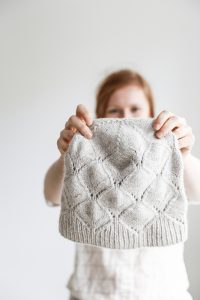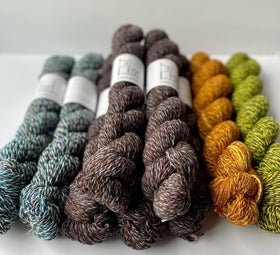
Kristin Ford of Woolfolk
How did you get started in the apple business?
We bought 25 acres on Sauvie Island, which was leased out to a farmer who was running cattle on it. Rich had a good friend, Dick Ponzi, in the winery business who talked us out of doing wine (too flat, soil is too rich) and had just been to France where he tasted 'true' hard cider.
We bought 1500 trees the first year, then I took a grafting class (came out of it with hands wrapped in toilet paper) and grafted 1000 trees the next year. We now have 5000 trees which we sell to Tieton Ciderworks, after making and selling our own for 5 years. I think we were a little ahead of the cider craze; I spent a lot of hours in Whole Foods pouring samples and say, "no, it's not supposed to taste like Martinelli's, and most wine does not taste like Welches Grape Juice".
What destines an apple for hard cider as opposed to applesauce or pie?
Hard cider needs a bittersharp and a bittersweet component to balance the sugar and acid in most eating apples. And most of the hard cider apples are pretty nasty tasting due to that bitter component.
We have about 40 varieties, primarily French and English. The English ones have great names, like Foxwhelp, Geeveston Fanny, Harry Master's Jersey, and Bulmer's Norman; the French names require a good accent, which I don't have....Pomme de Gris, Anere de Berencourt, Reine de Pomme, to name a few.....
What is something that most people don't know about apples?
Apple trees are grown from a grafted tree. The part of the plant below the graft is the "parent plant" and determines size and vigor. The upper part determines the variety. We use a dwarf rootstock so that most apples can be picked without a ladder. to me, it's pretty magical that the grafting actually works...

How does growing apples inform your yarn business?
There are around 12,000 merino yarns on Ravelry; what sets Woolfolk apart? The variety of sheep, including the genetics; the environment in which they are raised, and the care and breeding outlined by Ovis 21. If you look at the wool through a microscope, the scale pattern looks more like cashmere.

Seabed Hat in TYND by Sylvia McFadden
What does TYND mean and why did you choose that name?
I have chosen (unpronounceable!) Danish names for my yarn and pattern lines; I am half Danish, and since the other half (Woolfolk) got to be the headliner, I'm trying to keep the family happy! My daughter was studying in Copenhagen; I described the yarn to her, and she would send me a list of possibilities. I like clean, simple words that graphically look good. Tynd means fine or thin.
Ann Weaver was inspired by this interview to design Hard Cider Sazerac Mittens with two colors of Tynd.
What is something that most people don't know about wool?
I just read an interesting article on Merino, in particular...here's the gist of it.
Moisture on the surface of a textile promotes the growth of bacteria, which is the main cause of smelly clothes. Merino wool has a water repellent surface, which prevents bacteria growth and the odor resulting.
Merino wool is self-cleaning and doesn't hold smells as the creatine in the wool naturally breaks down any bad-smelling bacteria from the skin. The core of merino wool fiber consists of two types of cells that absorb different quantities of moisture. As a result, one type swells more than the other and they move together in a constant friction. This is what gives merino wool fibers their mechanical, self-cleaning effect.




Leave a comment